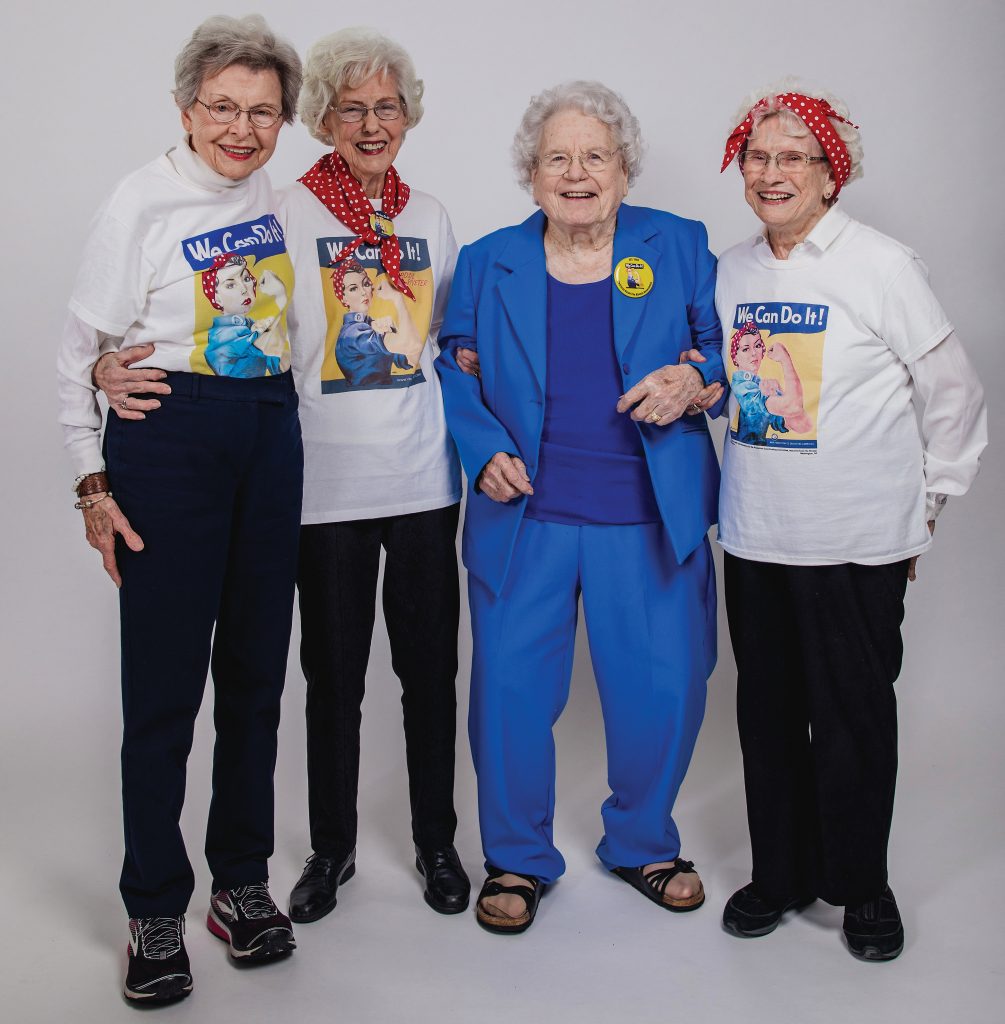
Photos by Jason Huynh
If you think back to the United States during World War II, whether you were born in the 1960s or the 1990s, all are familiar with the iconic image of Rosie the Riveter, what she stood for and continues to stand for today.
The star of a campaign aimed at recruiting female workers for defense industries during World War II, Rosie the Riveter helped to hire women in unprecedented numbers, as widespread male enlistment left gaping holes in the industrial labor force. In fact, between 1940 and 1945, the female percentage of the U.S. workforce increased from 27 percent to 37 percent, and by 1945 nearly one out of every four married women worked outside the home.
That percentage seems very low to us now, as according to the United States Department of Labor, women make up 57 percent of the labor force today.
Ms. Jane Tucker, who started the Rosie Revolution here in Rome, had always been familiar with Rosie the Riveter; however, she never quite pinned herself as one until about ten years ago when she joined the American Rosie the Riveter Association.
The American Rosie the Riveter Association (ARRA) honors, recognizes and preserves the story of the working women of World War II, and has been doing so since 1998. Members of the ARRA work to promote the advancement of patriotic ideals and loyalty to the United States of America.
Not all of America’s Rosie the Riveters were actual riveters. In fact, here in Rome we are lucky enough to house five Rosie the Riveters who each worked in a “man’s position” during World War II.
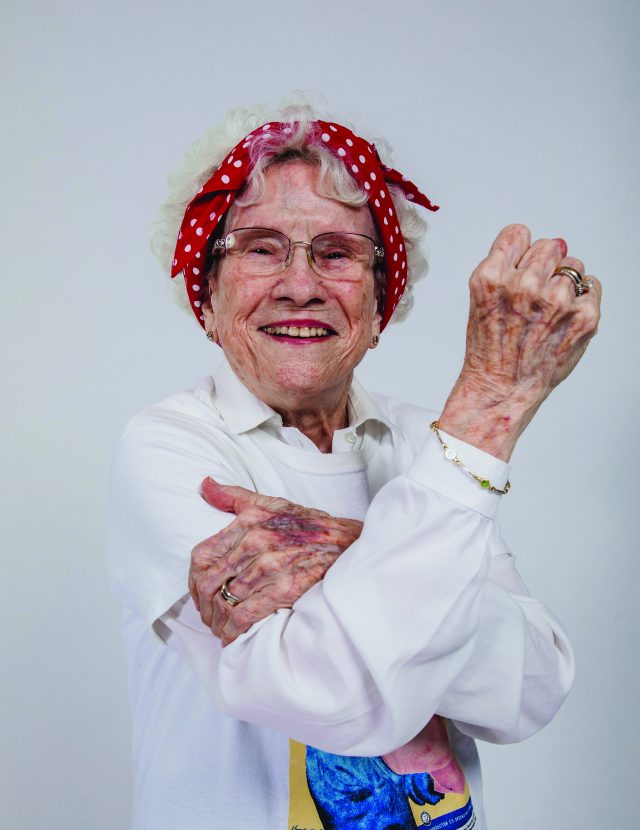
BettiAnne Ware-Harriss
Bettianne, born a resident of LaGrange, Ga., was only 12 years old and serving as a girl scout when the war began.
Calling herself a “nonagenarian” (someone who is 90-99 years old), Ms. Bettianne remembers rolling bandages with the Red Cross as a part of her service to the war.
“I know at the time I was pretty naïve regarding the war,” says Ware-Harris. “But even being only 12 years old, we did our part. The community was all involved with the war efforts. We would constantly recycle nylon and ration foods, etc.”
Bettianne remembers being able to finally wear her first pair of nylons whenever they began to take them and use them for parachutes during the war. It was moments like this when she knew that giving up things she loved, at the time, would eventually be helpful.
At first, Bettianne didn’t consider herself a Rosie the Riveter, as do many of the women who worked during WWII.
“I became a Rosie when I was living in North Carolina, about four years ago. This was because of Jane Tucker,” explains Ware-Harris. “Because I didn’t actually rivet, I didn’t think I qualified. She convinced me that rolling bandages did help, so I joined that next day.
“I have realized, and am still realizing, how important everyone who worked together during that period was… we did help to win the war,” continues Ware-Harris. “We couldn’t have done it without everyone. I am appreciative of the sacrifice that was made for me, to have the freedom that I have now. I am grateful. Took me a while to realize it, but I am grateful.”
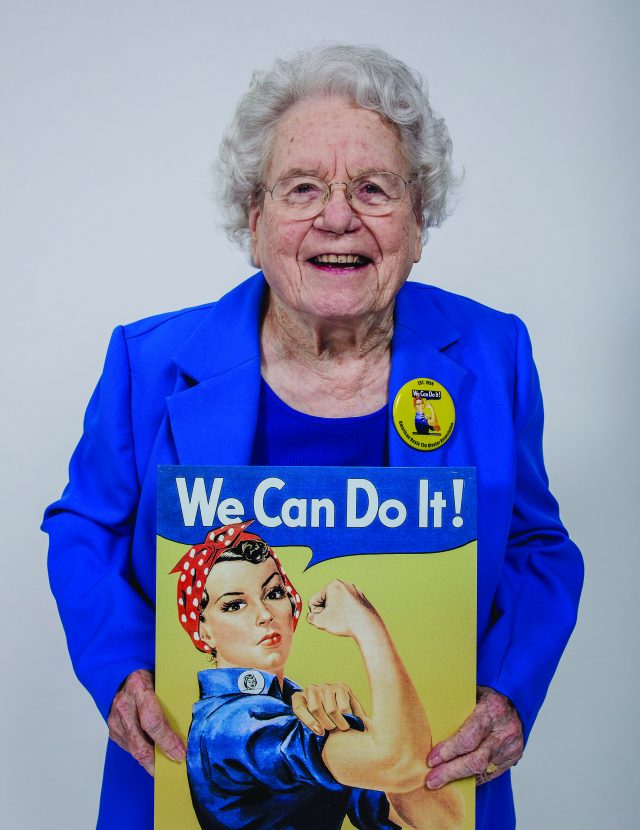
Joy Mitchell
Ms. Joy Mitchell, a native of Rome, Ga., describes her story as a happy, yet sad time in her life.
Joy worked at Battey State Hospital writing guest passes for everyone who came in and out of the hospital.
Battey General served as a hospital for sick, wounded and disabled World War II servicemen, and was located right here in Rome. The hospital opened in September of 1943 with Colonel D.B. Faust serving as its first executive officer.
“When I worked there, Battey General brought boys in from the European Theater in Charleston, S.C. and Savannah, Ga. Once the hospital began to develop, we started receiving wounded men from the pacific coast as well,” explains Mitchell.
“We had quarters by the quarters of space. It was big; I do remember that,” says Mitchell, when describing the hospital and recalling the grounds housing German prisoners during the war. “We never had any problems with them, from what I can remember.”
As an administrator, visitors had to pass through Mitchell in order to gain entry and visit the servicemen.
“I worked the three to eleven shifts. Sometimes we had to double up shifts because during the war, you stayed on post until you were relieved. I know I wrote thousands of passes,” recalls Mitchell.
Some of Mitchell’s most remarkable memories are when she was able to meet several famous people traveling through Rome during the war.
“I wrote passes for a lot of famous people. Henry Ford came through one day. I joked with him about getting his signature on a check for me, but he wouldn’t do it,” laughs Mitchell.
“Aside from being saved, the most exciting thing in my life was meeting Helen Keller while working at the hospital,” says Mitchell. “I remember communicating with her by taps in the palm of my hand. She had an interpreter there with her who would tell me what she was thinking. She would then put her hand over my face so that it was touching my mouth and throat. I would talk very slow and she would understand what I said. She would then answer me, best that she could. We ‘talked’ quite a bit, and tears were just flowing the whole time I was talking to her. It makes me tear up now thinking about what she accomplished in her life. It was wonderful to meet her.”
Mitchell met so many servicemen, as well as their families, and she remembers this time, labeling it “a wonderful, yet heartbreaking experience.”
“One of my favorite memories was getting to reunite a mother with her son. This woman came in—I was on morning shift thank goodness— around 8 a.m. and was asking to see her son who she hadn’t seen in three years. I had to tell her that visiting hours weren’t until two that afternoon, but I knew that I had to do something. I said, ‘You come right over here and wait and let me see what I can do.’
“So, I called down to his unit, section eight (where the patients with severe PTSD were housed) to speak with his nurse about getting him a section eight discharge. I took his mother down to the wing and she met her son halfway down the hall, both in tears,” smiles Mitchell.
“Things like that were so rewarding, but also just broke my heart. But, I will never forget it.”
Joy became a Rosie about a year ago, thanks to Ms. Jane Tucker.
“I knew about Rosie the Riveter, of course, but I didn’t think I was one because I didn’t rivet. However, my niece met Jane one day and she told her about what I did during the war, and I joined,” says Mitchell.
“Working during the war, especially at Battey, gave me a love for my country and a love for my flag that I don’t think I would have had without this experience.”
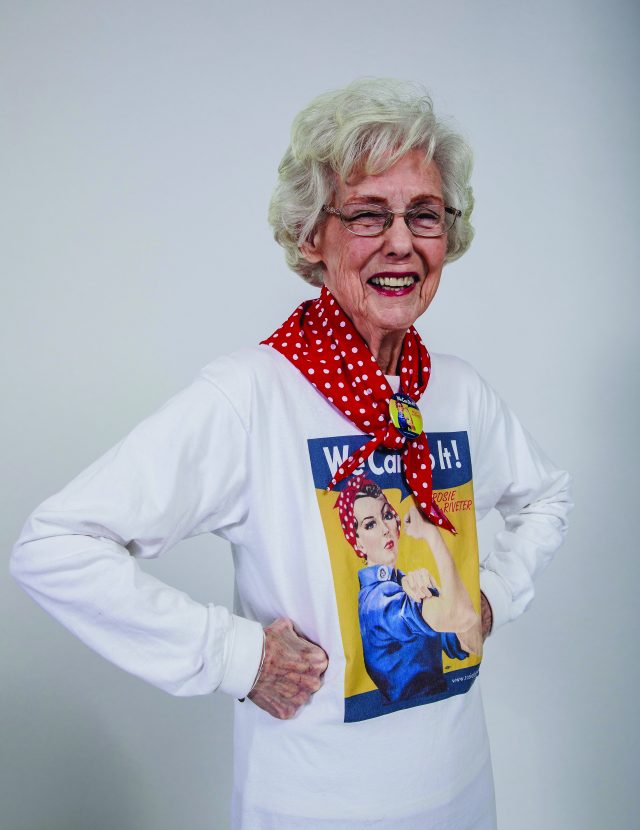
Mary Mcjunkin
Mary’s story is one she remembers fondly, even at 97-years-young.
She says it with pride, “I was born and raised right here–or around the corner— on East 2nd Street.”
Mary’s daughter, Janie McJunkin Cromer, who is considered a “Rosebud” in the ARRA, accompanied her mother to their interview with Grand.
A Rosebud is any female who is the direct descendant of a Rosie or a Volunteer Rosie.
“I grew up working at a ten cents store here on Broad Street and went to the old Rome High School,” says Mary. “During that time, and the rest of the time leading up to and during the war, everything was rationed. We had ration stamps we used to buy certain things, and we thought that was the extent of our involvement with the war.”
When Mary was just 18, she married the love of her life, Guy McJunkin. Guy and Mary were together 69 years before he passed.
“My husband (Guy) and I had just gotten married when he was drafted to basic training,” explains McJunkin. “From there, he was moved to San Pedro, California at Fort McArthur. At first, I wasn’t going to follow him, but he called me one day and asked me to move to California.
“I remember saying to him, ‘I haven’t ever been that far! I’ve been in Rome my entire life!’”
It didn’t take long before Mary changed her mind and jumped on a Greyhound bus the very next day. “I was 18 years old and traveled all the way across the states,” recalls McJunkin. “It took me five days and four nights to get there.
“When I got out to California after the long bus ride my husband, who guarded the coast line which was a target for the Japanese, had to pull guard duty that night and couldn’t come and pick me up,” says McJunkin.
Janie agreed, laughing, and stepped in to assist her mother with this part of the story.
“When she got off the bus, she didn’t have anywhere to go. Luckily, she found a woman who offered to help her, and she ended up staying at a Young Women’s Christian Association (YWCA) which is essentially a hostel or recreational facility for women in need,” says Janie.
After that night, Guy and Mary found an apartment in Manhattan Beach, which is when Mary began her work at the airplane factory (from the best Janie can figure out, it was at El Segundo).
“I worked third shift, so I had to take the Greyhound bus in order to go to work from Manhattan Beach to San Pedro/ El Segundo, which was about an hour ride both ways. I didn’t get no sleep!” says McJunkin.
While at the airplane factory, Mary worked on an assembly line that manufactured the parts for planes that were used during WWII. Looking for a workplace closer to home, Mary says she got lucky and found a job working in a bakery.
“I worked for a sweet Jewish family who was so generous to me during the time I was there. They would always call me the Southern girl, and our customers would ask for the “Southern girl” because they liked the way I talked,” laughs McJunkin.
Mary met three families that she still remains very close with for her days as a Rosie, which to Mary, says a lot about what you go through during a time like that.
When Guy left Manhattan Beach, Ca., he was transferred to Oklahoma and then to Kentucky. “I came back to Rome because he was getting transferred overseas to Italy,” says McJunkin.
“I didn’t know mother and daddy had done anything like this until I was older. They didn’t really talk about it,” says Janie. “To them, it was as if they had not done anything special. It was just what they did.”
Mrs. Mary learned about the ARRA through Ms. Jane Tucker, which is why she initially joined. “Becoming a Rosie now has given me a lot of pride in what I chose to do back during the war.”
Louvinia Jordans
Not pictured. Lou’s story was passed on to Grand through previous Rosie records
When Lou was in college, she had traveled home for Christmas when she learned about the bombing of Pearl Harbor on December 7, 1941. When she made it back on campus, all of the men had been put on trains as they were drafted for the war.
Lou worked as a cryptographic clerk at Arlington Station in Arlington, Virginia where she worked to break down and decipher decoded messages. Oftentimes, the messages were about where the troops were stationed or where they were being transferred. However, in one of the codes she helped crack, the group of cryptographers helped to save one small country in the Caribbean Sea.
Ms. Lou learned about Rosie through Ms. Jane Tucker as well, and still serves as an active member today.
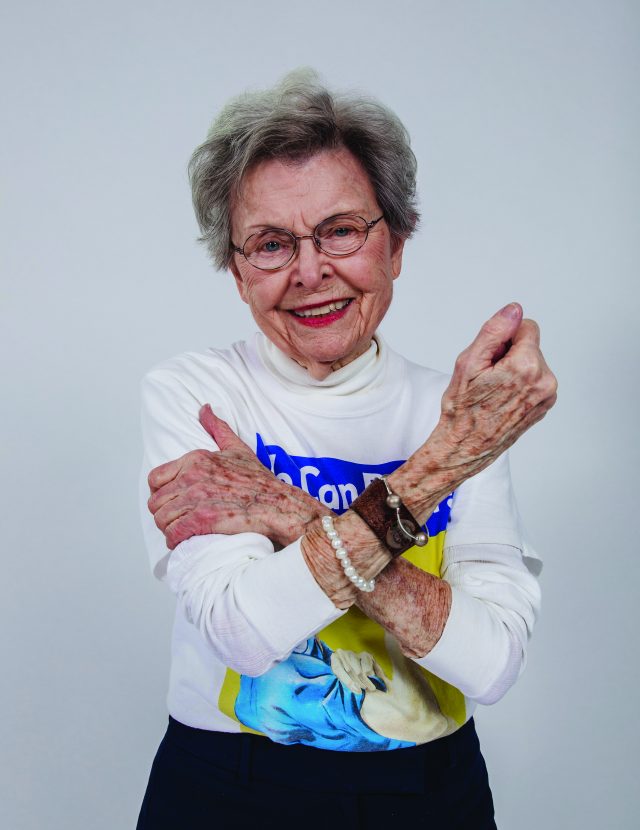
Jane Tucker
Last but most definitely not least, we have the ringleader of the Rosie Revolution in Rome, Ga., Ms. Jane Tucker.
Tucker worked as a rod welder during WWII where she built liberty ships in Savannah, Ga. when she was just 16 years old. “Back then, I was working as a rod welder. It was hard work,” says Tucker.
Jane is originally from Lineville, Ala. and stayed there during the last half of the depression with her mother and sister.
“Everybody was struggling to get things done back then,” recalls Tucker. “I worked in a five and ten cents store for a dollar a day and my mother made $25 a month working at the phone company for 12 hours a day. However, if people didn’t pay their phone bill, my mother couldn’t get paid. So, we would go without sometimes. It was a real struggle.”
Tucker remembers learning about her particular job from a cousin who lived in Savannah during the beginning of the war.
“When my cousin told me how much we would be making at the riveting job in Savannah, we packed up and headed on down on a train, for six hours, as I would then be making $1.25
an hour,” says Tucker. “To me, it was a great adventure! Where it was hard work and long hours, it was worth it.”
After Tucker finished work as a riveter, she attended school in Chicago, Ill. where she became a dental hygienist.
“I came to Rome in 1968 to work for my cousin who was a dentist. I worked as a dental hygienist for 55 years, which is where I have met a lot of the other Rosie’s here with me today,” smiles Tucker.
A pertinent theme in all of these remarkable women’s stories is that none of them knew they were considered Rosie’s until recently.
“Back when I was younger, you wouldn’t go around talking about your life because you were too busy living it. That was one of the reasons why it never dawned on us that we were Rosie’s earlier in life,” says Tucker.
“I didn’t know there was a National Association for Rosie the Riveters. My niece saw that you could join online, so she signed me up. I later began to see and listen to the stories that women would tell me about their lives, so I traveled to Nashville to a national meeting. When I came back, I was on a mission to start gathering other women together who were considered Rosie’s as well,” explains Tucker.
The women had a great turnout at the first meeting, which amazed Jane.
“We (Rosie’s) opened the door for women to know that they can do anything they wanted to, and to make it possible for women to do those things,” continues Tucker. “When we took our jobs, especially in factories, we knew that the men would get them back as soon as they got home. But the women were able to instill in their daughters and granddaughters the independence that they could have.”
Currently, Jane spends her time traveling around and speaking to students at schools and tells them of her story as a Rosie the Riveter.
From the wise words of President Franklin D. Roosevelt and Colonel Oveta Culp Hobby, “(Women) gave their sons to the military services. They have stoked the furnaces and hurried the factory wheels. They have made the planes and welded the tanks, riveted the ships and rolled the shells… Women who stepped up were measured as citizens of the Nation, not as women. This was a people’s war, and everyone was in it.”
We at GRAND are so thankful to have been able to sit down with these five incredible women and learn about their lives during WWII and beyond.



